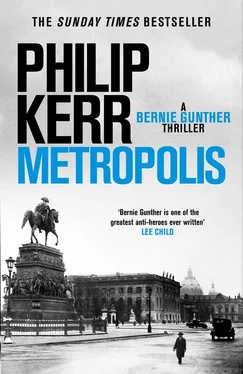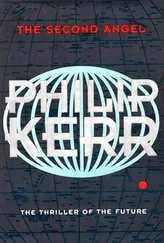‘Cops moved them on. For their own safety. Because of this killer who’s been preying on them.’
‘Any idea where they went?’
‘You could try outside the aquarium. That’s a popular pitch. Safer there, too. At least that’s what the Schupo men said.’
‘How’d they work that out?’
‘No trains there. Not much noise to cover the sound of a gunshot. Just the occasional bark of a sea lion.’
Still carrying the cripple-cart I walked north up Ansbacher Strasse and onto Kurfürstenstrasse, at the western end of which was the recently built zoo and aquarium. The two disabled veterans I was looking for were on either side of the main entrance, each positioned under the relief of one of the ancient animals that embellished the exterior. Further down the street was a life-size iguanodon. There was something about it that reminded me of the Reichsadler, the red-legged German imperial eagle; maybe it was the dinosaur’s beak-like snout, but it might have been the fact that both the iguanodon and Germany’s empire were extinct.
As well as being a dual amputee, the first man I spoke to was blind and a bit deaf, which made asking questions a more or less pointless endeavour; it seemed unlikely that he would have seen or heard anything of much interest to me. But the other man — a veteran staff sergeant with one leg and a pair of polished wooden crutches who was sitting underneath the stegosaurus relief — looked like a better bet. He was wearing a field cap with the canvas camouflage strip — safer than the previous red, and the transitional grey tunic that was typical of men from the early part of the war. On his remaining foot, he wore an ankle boot with puttees — a lot more comfortable than jackboots; the ribbon on his tunic was for the Prussian second-class Iron Cross, worn, correctly, in the second buttonhole, which was usually the quickest way of telling if a man was faking it. He had a thick white moustache that resembled a couple of sleeping polar bears, the kind of bright blue eyes that belonged in a German jeweller’s shop window, and two well-tanned ears that were almost as large as the Metzger biscuit tin now functioning as his begging bowl. I dropped several coins into the tin and then squatted down beside him. I lit a couple of Salem cigarettes and handed him one.
‘I hope you’re not here to feel sorry for me,’ he said.
‘I’m not even going to try, sarge.’
‘Or tell me I’m a disgrace to the uniform.’
‘You’re not. Any fool can see that. You get around the city much?’
‘Like a Canada goose. What do you think?’
‘No, I can believe it.’
‘You believe that, you believe anything, which is unusual in a cop. Listen, me and Joachim, my friend over there, we’ve already been moved once today. We’re not about to get up again.’
‘I am a cop. But I don’t intend trying to move you on. Besides, I don’t imagine you’re so easy to move when you don’t want to move.’
‘So I guess you want to talk about Dr Gnadenschuss.’
I pointed to his companion. ‘What about him?’
‘He doesn’t talk so well. Not since he got a bullet through his windpipe. But I don’t mind talking. I don’t mind talking at all.’
‘You’re not afraid of Gnadenschuss?’
‘Were you in the trenches yourself, young man?’
‘Yes.’
‘Then you already know the answer to that question. Besides. I’m not going to die today. I can’t.’
‘You seem very sure about that.’
‘They say that on the day you die you see your name written on the Spree. And since I already looked this morning, I’m not at all worried. I’d say I’m certain to outlive this government, wouldn’t you?’
He had a little tin mug on a piece of string that was tied to one of his crutches, into which I poured a generous measure of rum, before offering him a toast.
‘I’ll drink to that.’
He took the drink and I sipped from my flask.
‘Anyone wave a .25-calibre automatic in your direction, lately?’
‘No.’
‘Anyone else you know report anything like that?’
‘No.’
‘What about abuse? Respectable-citizen outrage. Get any of that?’
‘Plenty. Just the other day I got bawled out by some right-wing prick who thought I was a disgrace to the uniform. And once or twice from some kids. Queers from up west.’ He smiled. ‘These days, I come prepared for almost anything.’ From his puttee he drew a trench dagger, which had been meant to replace an off-duty soldier’s bayonet. ‘I used to say to myself, “How low can you get?” Then, in Berlin, I found out. What’s that you’ve got there, anyway? Looks like some Fritz’s klutz wagon.’
‘That’s exactly what it is. I found it abandoned on Wormser Strasse just a short way south of Wittenbergplatz. There’s a name inside it. Prussian Emil. I was wondering if you knew who he was, and maybe why he might have left it behind.’
‘The who is easy. Prussian Emil is a drug dealer, a burglar’s achtung — his lookout — and a very occasional beggar, for the sake of appearances. He carries a bugle and gives the brass a blow if the owner or the police should unexpectedly show up while the burglary is still in progress. He was in the army and was nearly shot for desertion, but he’s not crippled, which is one reason genuine beggars like me haven’t managed to put a stop to him; the other is that he’s a member of a ring. Only don’t ask me which one. He usually gives genuine schnorrers like me a few marks to help keep us sweet. But supposing we were to inform on him to the local police or take the law into our own hands — assuming we could get near him — then we’d soon find the ring had something to say about it. The why is pure speculation. If he abandoned that klutz wagon, the chances are he was obliged to leg it for some reason. Come to think of it, it’s a while since I saw him around.’
‘Does he work with one man in particular? Or just anyone who pays?’
‘Anyone who pays, I think.’
‘Can you give me a description?’
‘I’ll say one thing for him, at least, he looks like the real thing. Standard 1910 uniform with Swedish cuffs. Brown corduroy trousers. If you asked him he’d swear he was with the 248th Regiment from Württemberg. That’s deliberate and clever because he knows that if he was wearing a Prussian military uniform, there’s always a chance he might run into trouble in this town. Also a Charlotte Cross ribbon and a silver military merit medal. Dark glasses, which make him look like he’s blind. Of course, that’s when he’s working. When he’s not working, he’s thin, painfully thin. Cadaverous, even. And completely hairless. Oh, and he has a port-wine stain on his neck, like a careless waiter spilled something down his shirt collar.’
‘You know where I could find him? Or just look for him?’
‘No. Besides, for a drink, a cigarette and a few coins, I think you did pretty well out of me, copper.’
‘Would it make any difference if I put some paper in your box?’
‘Probably not. Look, there’s a club called Sing Sing, like the American prison. They say they’ve even got an electric chair, just for laughs. You could look for him there, if you dare. It’s the kind of place you need a steel undershirt. Just don’t say I mentioned it.’
I nodded and started to walk away. ‘There’s a password to get in,’ he added. ‘That has to be worth a couple of marks.’
I put a couple of notes in his hand and he saluted me and told me the password.
‘It was nice talking to you,’ I said. ‘If you think of anything else, my name is Bernhard Gunther and I’m at the Alex.’
‘Sergeant Johann Tetzel.’
Ernst Engelbrecht had left the Berlin police but he was frequently to be found behind his regular table at the Zum, in the arches of the S-Bahn station near the Alex. It was an atmospheric place. The owner, Lothar Kuckenburg, was an ex-cop and he’d decorated the walls with photographs of Schupo men and police athletic clubs. In pride of place, next to the till, was a picture of Lothar shaking hands with a previous Schupo commander, Hugo Kaupisch. Until he’d left, Engelbrecht had been an expert on local crime syndicates, and figuring he still was, I’d sought him out to ask what he knew about Angerstein. He might have disliked Jews and, of course, one Jew in particular, but he and I got on well enough and he never seemed to mind me picking his brains; indeed he always seemed to welcome it.
Читать дальше












